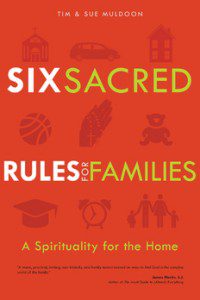 A well-known saying from Zen Buddhism notes: “Before enlightenment, I chopped wood and carried water. After enlightenment, I chopped wood and carried water.” Although deeply rooted in the Roman Catholic tradition, this is the essence of Tim and Sue Muldoon’s Six Sacred Rules for Family: A Spirituality of the Home. Quite often in life, the issue is not what we do but how we do it. Family life today, even in rural areas, can often be described as a state of constant busyness. Parents and children are always on the run and involved in one activity after another – in sports, school events, texting, phone calls, and navigating the web. Weary after a day’s work, both parents find themselves on the road, chauffeuring children from one place to the other, carpooling with other parents’ children, or having the nanny be the primary purveyor of transportation, homework supervision, and supper. Too often rush and anxiety characterizes family spirituality. It may be challenging but parents can find creative and flexible ways that enable them to nurture a sense of calm activity in their families and discern the difference between the essential and the optional in family life and children’s activities.
A well-known saying from Zen Buddhism notes: “Before enlightenment, I chopped wood and carried water. After enlightenment, I chopped wood and carried water.” Although deeply rooted in the Roman Catholic tradition, this is the essence of Tim and Sue Muldoon’s Six Sacred Rules for Family: A Spirituality of the Home. Quite often in life, the issue is not what we do but how we do it. Family life today, even in rural areas, can often be described as a state of constant busyness. Parents and children are always on the run and involved in one activity after another – in sports, school events, texting, phone calls, and navigating the web. Weary after a day’s work, both parents find themselves on the road, chauffeuring children from one place to the other, carpooling with other parents’ children, or having the nanny be the primary purveyor of transportation, homework supervision, and supper. Too often rush and anxiety characterizes family spirituality. It may be challenging but parents can find creative and flexible ways that enable them to nurture a sense of calm activity in their families and discern the difference between the essential and the optional in family life and children’s activities.
While few families may be able to fully replicate the disciplines the Muldoon’s share in Six Sacred Rules for Families, the key issue for parenting and family life is cultivating self-awareness that leads to experiencing the sacrament of the present moment. Family life is vocational in nature, the Muldoon’s assert, and I agree – our vocation in family life is to nurture an awareness of love, beauty, possibility, and wonder in the course of daily life. In John Lennon’s hymn to his son, “Beautiful Boy,” he reminds his little boy: “Before you cross the street take my hand. Life is what happens to you while you’re busy making other plans.” This is the nature of family life and spirituality: doing ordinary things in extraordinary ways and making sacred the present moments of life one by one. This takes time and the commitment to pause, notice, open, stretch, and respond to the present moment’s vocation – the interplay of our gifts and life situation with the concrete needs and possibilities of the moment.
Family life is a laboratory of the Spirit in which we nurture a spirituality of family through a combination of necessity, intentionality, synchronicity, and spontaneity. Family life is about necessity, first of all. We need to chop wood and carry water, and that means going to work (typically as single parents with primary custody or as two income families, where both parents go off to work, often working eight to ten hour days). We must earn a living, but earning a living is of one piece with fixing breakfast, going to the market, arranging play dates, reading bed time stories, helping with homework, and simply loafing with your children. For the sake of getting our work done or having some quiet time, we need to compartmentalize, but compartmentalizing our lives is ultimately an illusion, harmful to our and our family’s well-being. Life is lived whole-cloth, moving from one thing to another, and when we move with the Spirit, we experience optimum health and compassion. Airlines charge us to “put on the oxygen mask first” before placing it on our children’s faces. Counterintuitive, this means that you have to take care of yourself to take care of others.
Dealing with necessities invites us to foster our own spiritual practices, appropriate to our life situation. We don’t need to be victims of our lives; we can be agents in shaping our lives. At my congregation, South Congregational Church (United Church of Christ) in Centerville, MA, I spend a moment in each Children’s Sermon inviting the children and everyone else in church to breathe deeply and slowly. The most obvious spiritual practice is doing what we can’t live without in ways that deepen our spirits and that is breathing. We can transform our lives and experience of life by breath prayers, that is, simply stopping to breathe and let God’s calm and energy permeate your whole being. Here’s how a parent can do this on her or his own or with a child:
1) Upon awakening, take a few deep breaths, giving thanks for the gift of life.
2) As you greet your partner, spouse, brother or sister, and/or child/children, breathe deeply and exhale your love to them
3) Find moments throughout the day to breathe deeply, inviting the Spirit of peace into your life.
4) When you begin to feel stressed or busy, pause and breathe; notice how you feel, let go into the moment of breathing, and open to grace.
5) Spend a few minutes breathing with your child/children or another significant person.
Breathing the interruptions of the day opens you to the Spirit in the ordinary and extraordinary moments of life. You can teach your children to breathe gently and mindfully, opening to a calm that permeates the busyness of life.
A spirituality of breathing through life’s necessities opens us to a flexible intentionality. Parents should constantly ask themselves the questions: What is important in life? What are my priorities? What is my calling in this situation and in relationship to my family and personal spirituality? The traditional practice of “examination of conscience” (20) involves the interplay of intentionality and awareness. Having a personal and family vision statement, flexibly lived out, helps parents and children alike to learn to prioritize their lives. A vision is a polestar helping us in living fully and gracefully in the varied situations of life. A vision statement can be as simple as, “I am here to bless my family and everyone I meet” or “I treat my children with love, compassion, and understanding” or “I see Christ in my family and everyone I meet.”
Synchronicity involves openness to “God moments.” We must have our senses open to special moments with our children. Synchronous moments, meaningful coincidences in our lives, open our times with our families to inspiration and creativity, embodied in a surprising question from a child, an encounter with a neighbor in the front yard, or a sight on the way home from work. We open to synchronicity by cultivating lives of prayer and reflection. When our eyes are open to the holy, miracles of vision emerge that would otherwise be unnoticed. We discover we are on holy ground in every encounter and that God can speak to us through the most ordinary events.
Spontaneity is a reminder that we can’t pre-program spiritual growth, but must be flexible and open to changing our plans at the drop of a hat. We must recognize that even with our spiritual practices, intentionality, and vision, we are never fully in control. As Jesus said, the sun rises and the rain falls on the just and the unjust. Accidents occur; people stop by unannounced; larger political and economic factors shape our lives without our consent; illness strikes and so does serendipity. Having a vision and openness to God in every encounter enables us to let go of plans and awaken to the possibilities for compassion and growth in unexpected events.
The Muldoon’s have done a great service in their book. Taken flexibly, their text will awaken us to the beauty of family life and enable us to see holiness in ordinary tasks. It will enable our children to cultivate a sense of calm through all the seasons of life.
To read an excerpt from Six Sacred Rules for Families, visit the Patheos Book Club here.













